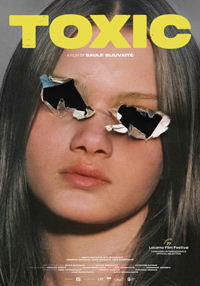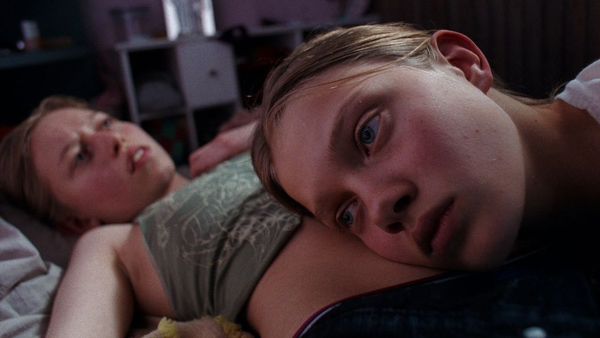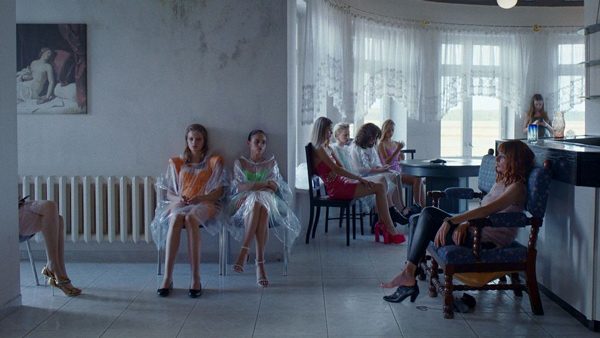The Taste of a Poison Paradise: Bliuvaite Explores the Commodification of Women’s Bodies
 Lithuanian filmmaker Saulė Bliuvaitė perhaps could not have contrived a more succinct title than Toxic (Akiplėša) for her debut feature, set in the bleak confines of an industrial town where dysfunction and desolation is the day-to-day norm. Not all is despairing, despite what it sounds like on paper, as two thirteen-year-old girls, each outcasts for their own unique reasons, forge a fast friendship, initially as a means for subconscious survival. While the template of the narrative is quite familiar, Bliuvaitė makes some distinctive choices elevating this beyond both miserabilism or sentimental absolution, meandering like its subjects toward some ill-formed ideas about how to escape an environment they did not choose and will certainly not uplift them.
Lithuanian filmmaker Saulė Bliuvaitė perhaps could not have contrived a more succinct title than Toxic (Akiplėša) for her debut feature, set in the bleak confines of an industrial town where dysfunction and desolation is the day-to-day norm. Not all is despairing, despite what it sounds like on paper, as two thirteen-year-old girls, each outcasts for their own unique reasons, forge a fast friendship, initially as a means for subconscious survival. While the template of the narrative is quite familiar, Bliuvaitė makes some distinctive choices elevating this beyond both miserabilism or sentimental absolution, meandering like its subjects toward some ill-formed ideas about how to escape an environment they did not choose and will certainly not uplift them.
Marija (Vesta Matulytė), a beautiful thirteen-year-old with a limp, is sent to live with her grandmother’s home in a small town. Her mother seems to be settling into a relationship with a new boyfriend and, thus, there’s no space for her at the moment. Her physical impediment is initially the source of ridicule by other cruel girls her age, who steal her jeans. Mistaking Kristina (Ieva Rupeikaitė) as the culprit, the two eventually bond over their enrollment in modeling classes which will supposedly lead to contracts and careers. Suddenly, their obsession with their bodies slips into hyperdrive. Together, they also begin hanging out with older boys, who give them weed and liquor and not so subtly desire sexual favors in exchange. With an impending photo shoot approaching, the girls are urged to bring along professional portraits, but none of their families have the kind of money to pay for this. Both girls find alternative ways to secure the money they need, but they slowly begin to learn the exchange rate is more detrimental than they considered.

The film’s opening moment suggests the dreary provocation we’ve become accustomed to from Michel Franco, and then even the spurious stuffiness of Alante Kavaite’s The Summer of Sangaile (2015). But as we oscillate between the eventually conjoining narratives of Marija and Kristinia, however, Bliuvaitė creates her own unique energy, which feels sort of like Ulrich Seidl’s approach to a narrative such as Agathe Riedinger’s Wild Diamond (2024). Since there’s a contemporary plethora of international projects regarding wild and reckless young girls coming of age, there are plenty which Toxic compares to, but strange bursts of hypnotic music also recalls Mika Gustafson’s Paradise is Burning (2023), where a resilient teenage girl also forges a somewhat hazardous relationship with a woman needing a similar outlet for her repressed emotions.
As Marija, Vesta Matulytė is positioned as having the greater opportunity to become a model based on the recruiter’s considerable praise for her uniqueness. Because of her limp, she’s also a bit more reluctant to engage in risky activities. Ieva Rupeikaitė’s Kristina innately seems to feel she must engage in more drastic activities to get ahead, which means doing whatever it takes to stay thin. Both young women are seen throwing up or starving themselves, but the real dramatic catalyst for the film (if one can call it that) is Kristina’s acquisition of a tapeworm pill someone has found for her on the dark web. As the last half of the film progresses, her parasite begins to make its presence known, which leads to the kind of trauma bonding which tends to cement a lifelong friendship.

Of course, the modeling recruiter ends up being a gateway to what essentially is a complex racket, culminating in a photoshoot to determine which of the current crop of girls can be shipped off to Japan or France to be gawked at. The various sequences set in the modeling school feel like a sterile factory where success portends a different kind of doom, a reminder of the influx of Eastern European models who infiltrated the US in the 1990s and dangerously shifted toxic standards of beauty in the fashion industry. Playing like a collection of experiences leading up to an integral moment for both young women, Bliuvaitė constructs less a narrative and more of a feeling, ending with an aimless visual release where it would seem we’re all really just spinning in circles—-sometimes just for the thrill of it.
Reviewed on August 15th at the 2024 Locarno Film Festival (77th edition) — Concorso Internazionale section. 99 Mins.
★★★/☆☆☆☆☆


